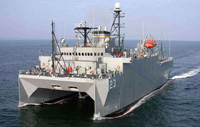Buzzwords appears each Friday on the Wide Angle blog and breaks down the lingo, jargon and hot topics of the world’s headlines.

In the recent standoff between five Chinese naval vessels and the U.S. surveillance ship, Impeccable, China claims that the Americans violated their “economic exclusion zone” (EEZ). What exactly is an EEZ? Most importantly, will it preclude my involvement in the high-stakes baccarat and unregulated monkey knife fights on international waters?
Territorial claims to the seas date back centuries, to when Spain and Portugal staked out entire oceans as their personal property. This didn’t sit well with some of the other boat-owning countries, however, and in 1608, a Dutch lawyer named Grotius made the case that “every nation is free to travel to every other nation, and to trade with it.” Grotius employs some persuasive evidence in his argument — e.g., God wouldn’t have bothered making wind if he didn’t want people to sail: “For do not the ocean, navigable in every direction with which God has encompassed all the earth, and the regular and the occasional winds which blow now from one quarter and now from another, offer sufficient proof that Nature has given to all peoples a right of access to all other peoples?” Ouch, Chinese national legal team — check and mate, I believe!
Today, coastal boundaries are largely defined according to the United Nations Convention on the Law of the Sea (UNCLOS), which came into force in 1994 after decades of debate. It lays out boundaries known as “territorial seas” (12 nautical miles offshore), “contiguous zones” (24 nautical miles offshore) and EEZs (200 nautical miles offshore), which extend to the point where the continental shelf meets the deep seafloor. Within the borders of its EEZ, a country has the exclusive right to exploit, develop, manage and conserve natural resources, including oil and natural gas. It was actually control of fish stocks that was an early impetus behind the establishment of the EEZs and currently, almost 99% of the oceans’ fisheries lie within some nation’s jurisdiction. Due to their long coastlines, the U.S., France, Indonesia, New Zealand, Australia and the Russian Federation are some of the nations with the largest areas claimed under their EEZ.
In the recent South China Sea encounter, the debate gets down to legal nuances regarding the purpose of the Impeccable’s mission. UNCLOS states that all countries’ vessels have freedom of navigation outside a nation’s 12-mile territorial waters boundary, but certain activities are prohibited. In this case, China claims an expansive interpretation of EEZ sovereignty, alleging the U.S. was carrying out scientific exploration for non-peaceful purposes — a violation in their eyes. The Pentagon’s legal team, however, says although the Impeccable was indeed on a military survey, this happened to be the sort of peaceful surveillance permitted under UNCLOS. (Begging the question – when is military surveillance ever truly done with peaceful motives? You can just imagine the Impeccable’s captain — “Phew, looks like China’s got some great submarines to defend itself with. Glad to hear it. They really deserve some top-notch underwater military technology. Ok, folks, let’s wrap it up and head home.”)
China’s been very touchy about its EEZ in the past, and it’s doubtful this will come to an easy conclusion any time soon.
(Sources: Foreign Policy’s The Argument, International Herald Tribune, Los Angeles Times, Sea Around Us Project, United Nations Division for Ocean Affairs and the Law of the Sea)
